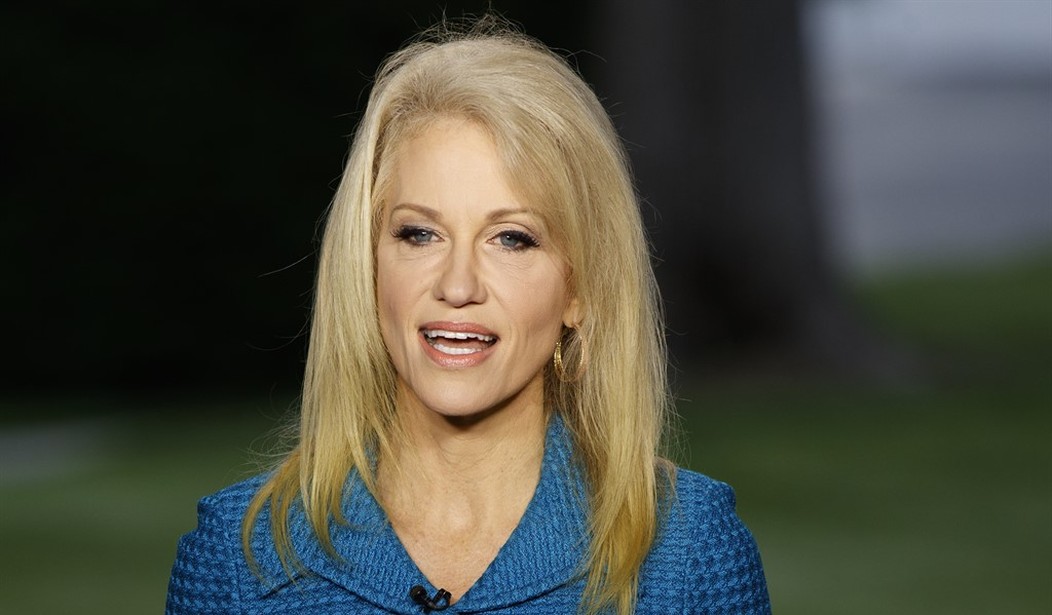Well, which is it? According to Politico, Kellyanne Conway didn’t rule out an attempt by the White House to stop James Comey from testifying to Congress about his conversations with Donald Trump. Conway told George Stephanopoulos on Good Morning America that “the president will make that decision,” as Conway noted that Comey’s last appearance in Congress didn’t do much for his credibility:
WATCH: @GStephanopoulos interviews @KellyannePolls on Jared Kushner, fallout from Pres. Trump's climate decision: https://t.co/cWJShLm5CW pic.twitter.com/09q4Fz98yA
— Good Morning America (@GMA) June 2, 2017
Conway, appearing on ABC’s “Good Morning America,” also left open the possibility that Trump might block Comey from testifying by invoking executive privilege. …
Asked directly if Trump intended to use executive privilege to block Comey from testifying, Conway said only that “the president will make that decision.”
“When Director Comey goes to testify, I think that will be a very clarifying moment. I would, again, repeat that his most recent sworn testimony had to be corrected almost immediately,” Conway said. “But it’s more important to have somebody testify under oath, frankly, than to have his friends and his former colleagues out there speaking to the media, not under oath.”
Stephanopoulos had the opposite takeaway from the exchange, however:
.@KellyannePolls tells me White House “will be watching” Fmr FBI Dir. Comey’s testimony– suggesting they will not be invoking exec privilege
— GeorgeStephanopoulos (@GStephanopoulos) June 2, 2017
Conway does leave the door open for a privilege claim, but … not by much. If Comey testifies without a claim being made, then it won’t be made at all, because Congress clearly wants to hear from Comey specifically about those conversations. They have until early Thursday to keep Comey from testifying on those points, but then that would eliminate the “very clarifying moment” too. She’s basically promoting Comey’s testimony here, almost as if it’s must-see TV, which doesn’t hint at all about an executive privilege claim.
Would executive privilege apply, even if Trump was inclined to invoke it? As long as the conversation did not stray into criminal conduct or cover-ups of criminal conduct, it would appear to fall into the classic definition — a president engaging in policy discussions with other members of the executive branch. Despite some misconceptions about this, a president does have the authority to direct the operations of the FBI, unless it’s to obstruct justice. Of course, the whole point of getting Comey to testify next week is to determine whether obstruction or other criminal conduct occurred in those conversations. If they had, though, Comey would have been obligated to report it at the time to the Attorney General and Congress.
The reason that Trump would be unlikely to claim executive privilege is that his conversations didn’t cross those lines. Andrew McCarthy points this out today by discerning between “pressure” and obstruction of justice:
Law enforcement is largely shielded from politics, but that is not because there are laws against political interference. Instead, presidents stay their hands because it would be politically damaging to intrude too deeply into policing and prosecution. The public wants those functions controlled by objective law, not self-interested politics. But even this is not an absolute: Implicit in the pardon power, for example, is the understanding that tempering harsh law-enforcement with pragmatic politics is sometimes desirable.
Our federal system, in any event, is based on political accountability, not expertise. We hope that law-enforcement officials will be good at their jobs, but we demand that they perform well by making their political superiors accountable to the public.
The FBI director is not an independent actor; the director is the subordinate of the president. No one appears to be alleging that Trump gave Comey a direct order to drop the Flynn investigation. Even if he had done so, however, it would have been a legitimate exercise of power – regardless of whether the FBI director found it a disagreeable exercise.
That’s the reason why an executive privilege claim — while possible — is not likely. Comey’s testimony would be much less politically damaging than attempting to block it, and getting into a new legal fight. Better to rip the Band-Aid off now and get past this issue than drag it out in court for several months.







Join the conversation as a VIP Member